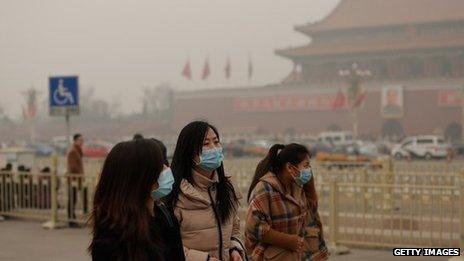Panasonic to pay China workers pollution compensation
- Published

China's pollution levels have led many expat workers to leave the country
Japanese electronics firm Panasonic has said it will pay its employees working in China a premium to compensate them for the country's high pollution.
Employees sent overseas typically receive hardship pay increases, but Panasonic is the first firm to explicitly pay more due to China's air quality problems.
Unrelenting smog has been an ongoing problem in many Chinese cities.
The move was announced as part of Panasonic's pay negotiations.
'War on pollution'
The firm refused to say how many Japanese staff would be impacted by the compensation and exactly how much they would receive in additional pay.
Chinese Premier Li Keqiang said China would wage a "war on pollution" as part of his opening remarks at this year's annual meeting of parliament, known as the National People's Congress.
As recently as last month, pollution monitors in Beijing said particulate readings soared to 15 times the daily maximum recommended by the World Health Organization.
That has made many workers reluctant to move to the country.
As well as the pollution premium, Panasonic said it would increase base pay for all of its workers by 2,000 yen ($19.5; £11.7).
It is one of dozens of Japanese firms to have announced pay increases this week.
Toyota, Nissan and Honda also announced base pay raises - the first hikes since the financial crisis in 2008.
Japanese Prime Minister Shinzo Abe has put pressure on Japanese firms to raise wages in an effort to combat deflation and boost the Japanese economy.
- Published25 February 2014
- Published10 March 2014
- Published16 November 2013